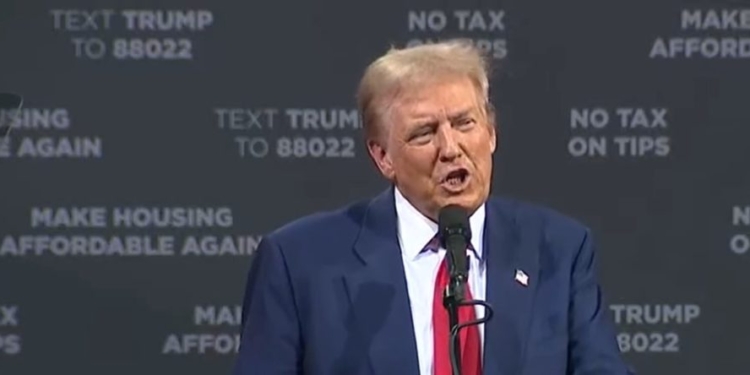Former President Donald Trump has called for “paper ballots, voter ID, and same-day voting” as steps on the path to improved election integrity. Rightly concerned about illegal election tactics, Republicans and conservative activists have rallied behind these ideas. The concerns over election fraud are real, but the suggested fixes have a common weakness in implementation: people.
The challenge with paper, ID, and conducting all voting on Election Day is the massive increase in manpower needed to make it happen — especially in counting paper ballots and staffing precincts to handle the massive volume of voters voting in person. When it comes to mobilizing election workers and poll watchers, Republican volunteers and conservative activists are simply outgunned by legions of union members and paid operatives.
But in the desire for paper ballots, it is crucial to scrutinize the potential consequences of such a shift. Far from being a simple fix, history and logistics reveal serious challenges with paper ballots that all Americans should carefully consider.
The Labor Imbalance
One of the most overlooked issues with transitioning to paper-only ballots is the labor-intensive nature of manual counting. In large jurisdictions like Harris County, Texas, where ballots can feature more than 100 individual races and propositions, manually counting a million ballots would mean tabulating around 100 million separate votes. This would be an enormous logistical challenge. This process would not only be slow but would likely introduce more human errors compared to machine counting — after all, in many cases, people created machines precisely to liberate them from tedious, repetitious tasks.
Moreover, there is an unequal distribution of resources when it comes to election workers. Democrats, who often rely on organized labor, have the advantage of paid poll workers, while Republicans tend to rely on volunteers. A clear example of this imbalance has been revealed in the runup to the 2024 election in Detroit, where approved GOP poll watchers were outnumbered 7-to-1, making it impossible for Republicans to monitor the voting process effectively.
If determining election results became more reliant on manual labor through paper ballots, this imbalance could leave Republicans at a debilitating structural disadvantage.
Historical Failures With Paper Ballots
The image of paper ballots as a more secure and transparent voting method is not rooted in reality. Consider New York’s notorious Tammany Hall, which controlled the city’s politics — and with it, often the state and federal government — off and on for some 150 years using a corrupt paper ballot system. Tammany Hall operatives stuffed ballot boxes, manipulated vote counts, and used intimidation to ensure their candidates remained in power. Similarly, the infamous “Box 13” scandal in Texas during the 1948 Senate primary race helped Lyndon B. Johnson secure his victory through blatant fraud, demonstrating the susceptibility of paper ballots to manipulation when one party controls the process, end-to-end.
The Role Of Human Error
Paper ballots may seem like a safeguard against fraud, but they introduce a greater risk of human error in counting. The monotonous, repetitive task of hand-counting millions of ballots can easily lead to mistakes. Machines, by contrast, are designed to handle this process efficiently and with far fewer errors. Machines do fail — or can be programmed incorrectly — but proper testing under trained, bipartisan observation catches most problems. Thus, a properly tested machine system is always more accurate than human counters. It is also worth noting that most states already use a hybrid system where votes are cast on paper but scanned and counted by machines, retaining a paper trail for audits if needed.
A Balanced Approach Is The Solution
Instead of an all-or-nothing return to paper ballots, a balanced approach using both technology and paper trails is more sensible. Modern systems that scan paper ballots provide a verifiable paper trail while leveraging the speed and accuracy of machines. Ensuring that representatives from both major political parties oversee the voting and counting processes is the best way to maintain transparency and trust.
Conservatives should be wary of the unintended consequences of paper-only ballots. Historical examples show that paper ballots are not a panacea for election security. Additionally, the labor-intensive nature of manual counting could exacerbate the existing disparities between paid Democratic election workers and Republican volunteers, leaving conservatives unrepresented at the precinct and at the count. By refining and overseeing the systems we already have, conservatives can ensure both transparency and efficiency without ceding an electoral advantage to the paid platoons of the left.
There is no silver bullet in the drive to restore confidence in our elections — the stakes are too high, and partisans will always probe and push for advantage, whether by legal or illegal means. This means that we must be on guard during every election with our elected representatives constantly on the lookout for election loopholes that need closing.
Chuck DeVore is Chief National Initiatives officer at the Texas Public Policy Foundation. He served in the California State Assembly and is a lieutenant colonel in the U.S. Army Reserve. He’s the author of “Crisis of the House Never United.”
The views and opinions expressed in this commentary are those of the author and do not reflect the official position of the Daily Caller News Foundation.
(Featured Image Media Credit: Screen Capture/CSPAN)
All content created by the Daily Caller News Foundation, an independent and nonpartisan newswire service, is available without charge to any legitimate news publisher that can provide a large audience. All republished articles must include our logo, our reporter’s byline and their DCNF affiliation. For any questions about our guidelines or partnering with us, please contact [email protected].



























 Continue with Google
Continue with Google